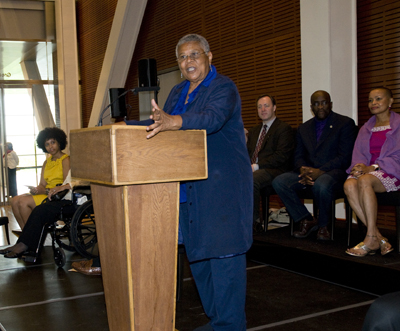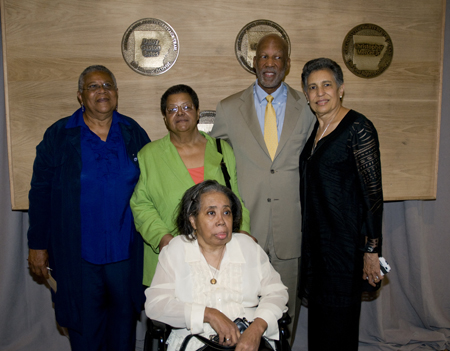Why Honor The Little Rock Nine?!
Almost 55 years ago, nine students successfully integrated Central High School. So this year, the UALR Institute on Race and Ethnicity honored the Little Rock Nine, L.C. and Daisy Bates, and Christopher Mercer Jr. for their efforts to end segregation in education during a public ceremony on July 14.
Each honoree was honored with a plaque bearing their name that will be added to the Arkansas Civil Rights Heritage Trail in August.
 Minnijean Brown Trickey spoke on behalf of the Nine and said she has often been told that people are ‘tired of hearing about the Little Rock Nine,’ and she wonders how it is possible they do not see the relevance. I must agree with Trickey.
Minnijean Brown Trickey spoke on behalf of the Nine and said she has often been told that people are ‘tired of hearing about the Little Rock Nine,’ and she wonders how it is possible they do not see the relevance. I must agree with Trickey.
It reminds me of a story a friend of mine once told me. She is a military wife, and moved to the south in the 1980’s because of her husband’s job. She said that though the “Colored” signs had been taken down from the water fountain in the base cafeteria, there was a very clear imprint left behind on the wall and so the letters C-O-L-O-R-E-D remained imprinted there like a somber but clear reminder.
Like that sign, the ordeal endured by the Nine is still very much imprinted in the minds of those who watched it on TV, or in person as it unfolded. It is clear in the minds of us who read about it in our history books or listened to our families tell us the story. It is keenly clear to anyone who has ever been rejected, denied, shunned, or dismissed.
We see the value in the history of the desegregation of Central High School because we realize the Nine are more than the stance they took against unequal education; they are human beings.
The Little Rock Nine collectively have become an iconic entity, but the Nine were, and are, individuals: Ernest Green, Elizabeth Eckford, Jefferson Thomas, Terrence Roberts, Carlotta Walls LaNier, Minnijean Brown Trickey, Gloria Ray Karlmark, Thelma Mothershed Wair, and Melba Pattillo Beals.
 They are individuals who fought the non-violent fight through irrational turmoil to make sure I could have an opportunity like this – to earn a college degree, to obtain a career I enjoy, to write a blog at a metropolitan, community-minded, diverse university and be valued.
They are individuals who fought the non-violent fight through irrational turmoil to make sure I could have an opportunity like this – to earn a college degree, to obtain a career I enjoy, to write a blog at a metropolitan, community-minded, diverse university and be valued.
Why do we have commemorations to educate the public and celebrate civil rights? Because, every day we do not acknowledge our failings or celebrate our triumphs as a state, we slow progress.
The physical signs that separated us not that long ago have been taken down. But, until we learn to strip away the hardest parts – the part that pretends race relations is no longer a issue, the part that refuses to confront our own individual shortcomings, the part that has difficulty empathizing with those who are different from ourselves – then we as citizens need a testament like the Arkansas Civil Rights Heritage Trail to remind us that the walk may not be easy but the journey is worth it…
…and OUR journey continues.